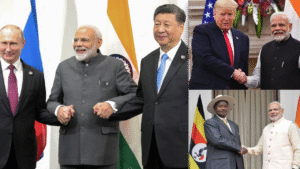US Remittance Tax Proposal: A Hard Hit for Indian Families

NEW YORK — A new U.S. bill, nicknamed “The One Big Beautiful Bill,” has Indian Americans on edge. Slapped with a proposed 3.5% tax on money sent abroad by non-citizens, the plan could make it pricier for the 4.5 million-strong Indian diaspora to support loved ones back home. With India banking on $32 billion in remittances from the U.S. last year, this tax threatens to squeeze family budgets and ripple through India’s economy, stirring up worries about fairness and the future of these vital cash flows.
The bill, rolled out on May 12, 2025, by the House Ways and Means Committee, aims to extend tax cuts from 2017 and fund border security. But buried on page 327 is a rule that’s got people talking: a 3.5% tax on every dollar non-citizens, including H-1B visa holders, F-1 students, and green card holders, send overseas. No minimum amount is spared, so even small transfers for things like medical bills or school fees get hit. “It’s like a penalty for helping family,” said Priya Sharma, a tech worker in Austin, who sends $300 monthly to her parents in Delhi. “I’m already paying taxes here why this extra burden?”
India, the world’s top remittance destination, pulled in $120 billion in 2023-24, with nearly a third from the U.S. This tax could siphon off $1.12 billion a year if the flow stays steady. In places like Kerala and Gujarat, where these funds pay for everything from groceries to home loans, the impact stings. “My sister in California helps with my son’s college fees,” said Anil Nair, a shopkeeper in Kochi. “Losing even $10 a month hurts us.” Economists warn that reduced remittances could weaken India’s consumer spending and strain its foreign reserves, especially with global prices still high.
There’s another worry: the tax might push people toward shady channels like hawala, which dodge oversight and can fuel illegal activity. “If legal transfers cost too much, folks will get creative,” said Mumbai-based financial advisor Vikram Desai. Social media’s buzzing with similar fears X users like
@IndiaEconTalk point out that less NRI money could cool off India’s hot real estate and stock markets.
The tax feels unfair to many. Indian Americans, who power industries like tech and healthcare, say they’re being targeted while U.S. citizens sending money abroad get tax breaks. “We’re part of America’s success story why punish us?” asked Dr. Sanjay Gupta, a community leader in New Jersey. Groups across California, Texas, and beyond are rallying, holding town halls and flooding Congress with letters to scrap the tax.
Supporters, though, argue it’s a way for non-citizens to chip in for things like border security. Backed by President Donald Trump, the bill could pass the House soon and hit the Senate by June 2025, possibly becoming law by July. Some NRIs are rushing to send money now to beat the deadline.
For India, the stakes are high. Remittances make up 3.4% of its GDP, propping up millions of families and steadying the rupee. A slowdown could dent property markets in cities like Bengaluru and Ahmedabad, where NRIs are big players. “This isn’t just about families it’s about India’s growth,” said economist Rhea Malhotra.
As the Senate vote looms, Indian Americans like Sharma feel caught in the middle. “We work hard here and want to support our roots,” she said. “This tax makes it tougher to do both.” With India pushing for cheaper global remittances at the WTO, the U.S. proposal feels like a step back. The coming weeks will show if advocacy can soften the blow or if Indian families will have to tighten their belts.








